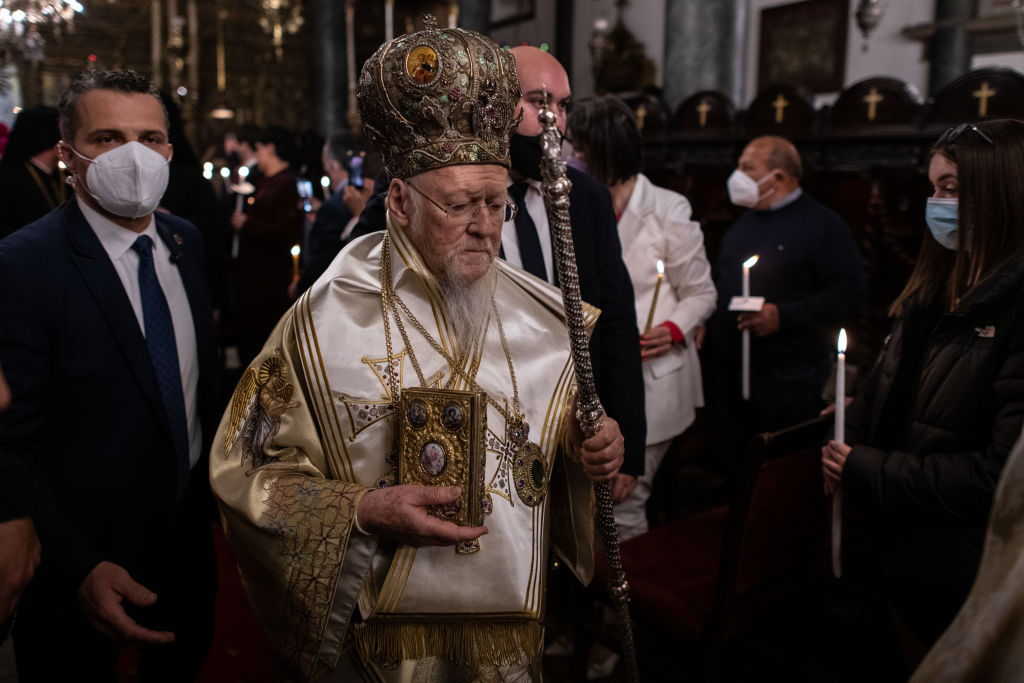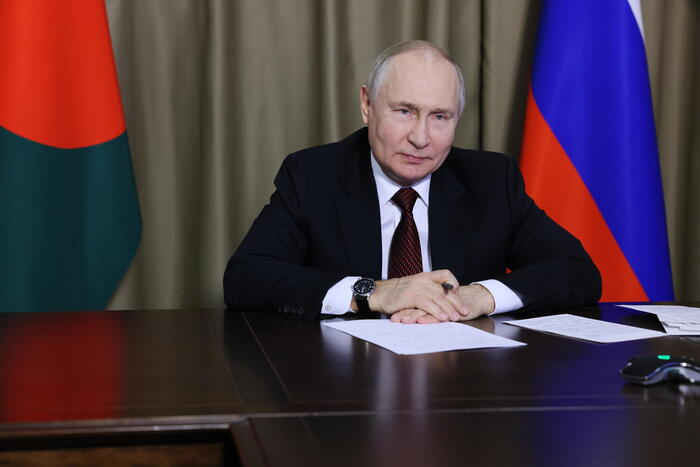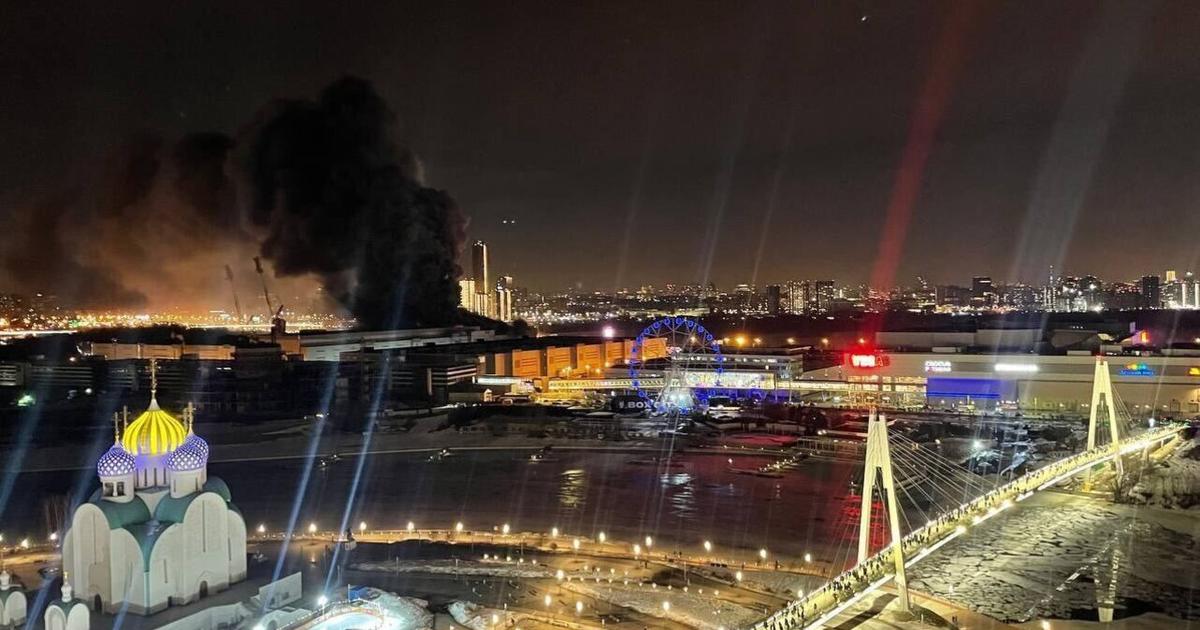The Russian Orthodox Church supports the invasion of Ukraine 4:20
(CNN Spanish) --
In Russia's war in Ukraine, a powerful name regularly appears alongside that of Vladimir Putin: Kirill, patriarch of the Russian Orthodox Church, head of a community of tens of millions of faithful Christians.
Mentions of Kirill, who has openly supported the war, are multiplying: this week it became known that he is one of the 58 people included in the sixth package of European Union sanctions on the bloc, two sources told CNN, and the Pope Francis revealed that he had told him not to become an "altar boy for Putin".
Who is it exactly?
We explain it to you.
Kirill's long career in the Russian Orthodox Church
Kirill, born in 1946 in what was then Leningrad (now St. Petersburg), was the first patriarch of the Russian Orthodox Church elected after the fall of the Soviet Union, according to the Encyclopedia Britannica.
He has held his position since 2009, when he succeeded Aleksey II.
By then his career within the church was decades old: he had graduated from the Leningrad Theological Academy in 1970 and, a year later, left for Geneva as a representative of the Russian Orthodox Church in the World Council of Churches.
After his return in 1974 he was rector of the academy where he graduated and archbishop of two cities, among other positions he held before being named head of the Russian Orthodox Church.
He received a church that, according to the encyclopedia, "had experienced tremendous revitalization and growth following the end of official state atheism."
advertising
Russian President Vladimir Putin congratulates Atriarch Kirill during a ceremony in Moscow on November 20, 2021. (Photo by Mikhail Metzel/SPUTNIK/AFP/Getty Images)
What place does Kirill occupy among Orthodox Christians
Perhaps you have heard references to Kirill as the "Russian Pope".
However, this term is incorrect.
The Orthodox do not have a figure equivalent to that of the pope.
(In fact, the Great Schism of 1054 in which Catholic and Orthodox Christians split had a theological basis and the primacy of the pope is a key point: the Orthodox do not consider him to be the supreme leader of the Christians).
Worldwide, the Orthodox Church is decentralized, with 15 branches, and decisions are made by a council of patriarchs.
There is indeed a leader of Orthodox Christianity and it is not Kirill.
That title, technically, belongs to the Ecumenical Patriarch of Constantinople (now Istanbul), Bartholomew I.
Patriarch Bartholomew.
(Credit: Burak Kara/Getty Images)
Bartholomew, in fact, has been critical of Kirill for his position regarding the war: he recently said that the Russian should not have identified so much with Putin.
"It is detrimental to the prestige of the whole Orthodoxy because Orthodoxy does not support violence, war, terrorism," he said in an interview in Istanbul.
However, Kirill, with his flock of millions of followers, is in any case the leader of the largest, and in some ways the most challenging, branch of Orthodoxy.
His vision on Ukraine
Kirill sees Ukraine as an integral and historical part of his Russian church, Georg Michels, a professor of history at the University of California, Riverside, told CNN.
Kirill's vision of Christianity, like Putin's idea of Russia, is based on a nationalist fantasy of the once-great "Russian World" that used to include Ukraine, CNN's Delia Gallagher explains in this report.
According to that view, the Russian Orthodox Church and state were founded together around the year 988 with the baptism of Vladimir I, the ruler of Kievan Rus', a territory that included parts of present-day Ukraine, Russia, and Belarus.
The capital, precisely, was the current Kyiv.
"Early in the war, Patriarch Kirill delivered a sermon emphasizing the God-given unity of Ukraine and Russia," Michels recalled in an interview with UC Riverside News.
"Kirill denounced the 'evil forces' in Ukraine who want to destroy this unit," Michels explained.
Kirill later linked such "evil forces" to gay pride events.
According to the patriarch, the war in Ukraine has to do with "a fundamental rejection of the so-called values offered today by those who claim world power", that is, the West.
The "test" for which side you're on, Kirill said, is whether your country is willing to hold gay pride parades.
"To enter the club of those countries it is necessary to celebrate a gay pride parade. Not to make a political statement, 'we are with you', not to sign any agreement, but to celebrate a gay parade," he said during the sermon of the 6th of March.
A close link with Putin
Kirill has called Putin's era at the helm of Russia a "miracle from God."
His relationship with the president is close.
Olenka Pevny, an associate professor of Ukrainian studies at the University of Cambridge, told CNN that in a situation where there is almost no separation between state and church, Kirill is "Putin's right hand man."
CNN's Delia Gallagher puts it this way: It's about "a Christian leader in an unholy alliance with a president, blessing a war that is unleashing death and destruction."
In 2019, the Kremlin spent tens of millions on lavish renovations for Kirill's St. Petersburg residence.
Kirill and Francisco, a long way from their historic meeting in Cuba
In 2016, the Havana International Airport witnessed a historic meeting: for the first time a Catholic pope and a Russian Orthodox patriarch met face to face.
They were Francisco and Kirill who, through a hug, then made a joint call to protect persecuted Christians.
"We are not competitors, but brothers," the pope said.
That meeting followed decades of attempts by the Vatican to meet with the Russian patriarchs, efforts that were amplified after the fall of the Soviet Union.
However, the Orthodox had accused the Catholics of wanting to encroach on their turf with new churches in Russia and other countries that had been part of the bloc.
Russia's war in Ukraine, however, opened a new chapter in the relationship between the religious leaders.
In mid-March, the Vatican confirmed that both religious leaders had held a video conference in which Francis told him that "the Church must not use the language of politics, but the language of Jesus" and that they must unite "to stop the fire." ".
The following month, Francis said his relationship with Kirill was "very good" but that a meeting scheduled for June had been canceled because in the current context "it could cause a lot of confusion."
And just a few days later, the public rhetoric turned harsher.
Francis said that during the 40-minute virtual zoom meeting with Kirill in March, he warned him not to become "Putin's altar boy."
Kiril loses support inside and outside Russia
His openly pro-war position is costing him.
Some 300 Russian Orthodox priests and deacons, including many who actually live and work in Russia, have signed an open letter protesting the war, a risky act of disobedience in the Putin-led country.
"The Church is not a communist party that only speaks through its leader," said Russian Orthodox priest Father Andrey Kordochkin, dean of the Cathedral of Santa Maria Magdalena in Madrid, and a signer of the letter.
The Russian Orthodox Church in Amsterdam has severed ties with the one in Moscow, while in Ukraine 12 Russian Orthodox dioceses have removed Kirill's name from their liturgies.
The Ukrainian Orthodox Church has for centuries had special historical ties with the Russian Orthodox Church, a relationship that differentiated it from other independent Orthodox churches, such as those of Georgia, Cyprus, Greece, Romania and others that are part of Eastern Orthodox Christianity.
In 2018, after the invasion of Crimea, part of the Ukrainian Orthodox Church had already severed its ties with the Russian Orthodox Church, an act that raised the ire of the Russian patriarch.
With information from CNN's Delia Gallagher and Daniel Burke.
war in ukraine







/cloudfront-eu-central-1.images.arcpublishing.com/prisa/2C7HIYVHBZDA3HEZNJ6CDVQPUM.JPG)

